Emotional intelligence (EI) has become an increasingly important quality in the realm of business leadership. Defined as the ability to recognize, understand, and manage our own emotions as well as the emotions of others, EI is crucial for effective leadership. Michael Shvartsman, a respected business leader and expert from New York, provides his insights on the significance of emotional intelligence and how it shapes successful leadership.

Understanding Emotional Intelligence
Emotional intelligence encompasses several key components: self-awareness, self-regulation, motivation, empathy, and social skills. These elements contribute to a leader’s ability to handle interpersonal relationships judiciously and empathetically.
- Self-awareness involves recognizing one’s own emotions and their impact.
- Self-regulation refers to the ability to control or redirect disruptive emotions.
- Motivation is the drive to achieve for the sake of achievement.
- Empathy involves considering others’ feelings, especially when making decisions.
- Social skills are the tools used to manage relationships and build networks.
“Emotional intelligence is the foundation upon which strong leadership is built,” says Michael Shvartsman. “It allows leaders to connect with their teams, foster a positive work environment, and navigate the complexities of the business world with greater ease.”

The Impact of Emotional Intelligence on Leadership
- Enhancing Communication
Leaders with high emotional intelligence are adept communicators. They can convey their thoughts and ideas clearly while also being attentive listeners. This two-way communication fosters trust and respect. “Effective communication is key to any successful leadership,” Michael Shvartsman notes. “Being able to listen and respond empathetically to your team can significantly enhance collaboration and morale.”
- Building Strong Relationships
EI enables leaders to build and maintain strong relationships within their teams and across their organizations. By understanding and addressing the emotional needs of their employees, leaders can create a more cohesive and motivated workforce. “Relationships are the bedrock of any business,” says Michael Shvartsman. “Leaders who prioritize emotional intelligence are better equipped to build lasting connections that drive success.”
- Fostering a Positive Work Environment
A leader with high EI contributes to a positive and inclusive work environment. By managing their own emotions and understanding the emotions of others, they can create a supportive atmosphere where employees feel valued and respected. “A positive work environment leads to higher employee satisfaction and productivity,” Michael Shvartsman explains. “Emotional intelligence is key to cultivating such an environment.”
- Effective Conflict Resolution
Conflicts are inevitable in any workplace, but leaders with strong emotional intelligence can handle disputes effectively. By empathizing with all parties involved and maintaining control over their own emotions, they can mediate conflicts in a way that promotes understanding and resolution. “Conflict resolution is a critical leadership skill,” Michael Shvartsman asserts. “Emotional intelligence allows leaders to navigate disputes calmly and fairly, ensuring a harmonious work environment.”
- Driving Organizational Success
Ultimately, emotional intelligence drives organizational success by enabling leaders to make informed, empathetic decisions that benefit both employees and the business. Leaders who understand the emotional dynamics of their teams can inspire loyalty, boost engagement, and drive performance. “The impact of emotional intelligence on business outcomes cannot be overstated,” says Michael Shvartsman. “Leaders who prioritize EI are more likely to achieve long-term success.”

Expert Opinion: Michael Shvartsman
Michael Shvartsman emphasizes that emotional intelligence is a cornerstone of effective leadership. “In today’s complex business landscape, leaders need more than technical skills and expertise. Emotional intelligence is what sets great leaders apart,” he says. “It allows leaders to connect on a human level, which is essential for building trust, fostering innovation, and driving sustainable growth.”
Shvartsman also highlights the importance of continuous development in emotional intelligence. “EI is not a static trait. It can be developed and refined over time. Leaders should actively seek opportunities to enhance their emotional intelligence through self-reflection, training, and feedback.”
Emotional intelligence is a critical component of successful business leadership. It enhances communication, builds strong relationships, fosters a positive work environment, enables effective conflict resolution, and drives organizational success. As Michael Shvartsman says it, “Emotional intelligence is the key to connecting with your team, inspiring loyalty, and achieving long-term success in business.” Leaders who prioritize and develop their emotional intelligence are better equipped to navigate the challenges of the modern business world and lead their organizations to greater heights.


